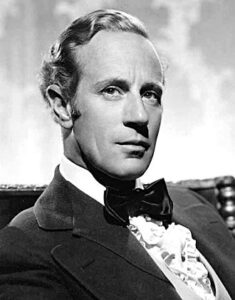
Leslie Howard (April 3, 1893 — June 1, 1943) was born in London as Leslie Howard Steiner to Ferdinand Steiner, a Hungarian Jewish immigrant, and his wife Lillian Blumberg. The family Anglicized their surname from Steiner to Stainer during World War I to guard against anti-German prejudice. Leslie volunteered in 1914 and was commissioned the following year as a subaltern with the Northamptonshire Yeomanry. He received a medical discharge in 1916 upon a diagnosis of neurasthenia, a nerve disease, the same year that he married Ruth Evelyn Martin. They had a son Ronald, and a daughter, Leslie, both of whom went into the movie business. In 1920, he served legal notice that he was formally changing his surname to Howard.
Having done some acting in London, he moved to New York where he gained notice in such plays as Aren’t We All?, Outward Bound, and The Green Hat. Star billing came in 1927 with Her Cardboard Lover and in 1929 as a time traveler in Berkeley Square. In 1933, he starred in the film version of Berkeley Square, for which he received an Academy Award nomination as best actor. In 1934, he played the lead in The Scarlet Pimpernel against actress Merle Oberon. In 1936, he co-starred with Betty Davis in The Petrified Forest and with Norma Shearer in Romeo and Juliet. In 1938, he won another Academy Award nomination for his portrayal of Professor Henry Higgins in the film version of Pygmalion with Wendy Hiller playing Eliza Doolittle.
In 1939, he starred with Ingrid Bergman in Intermezzo and, in perhaps his best-known role, he performed as Ashley Wilkes in Gone with the Wind in a cast that included Clark Gable, Oliva de Havilland, and Vivian Leigh. He returned to England to help with the war effort thereafter, making such World War II films as 49th Parallel, Pimpernel , and The First of the Few.
Howard died in 1943 when the German Luftwaffe shot down a plane on which he was a passenger on a flight between Portugal and Britain.
Tomorrow, April 4: Rabbi Nachman of Breslov
*
SDJW condensation of a Wikipedia article.